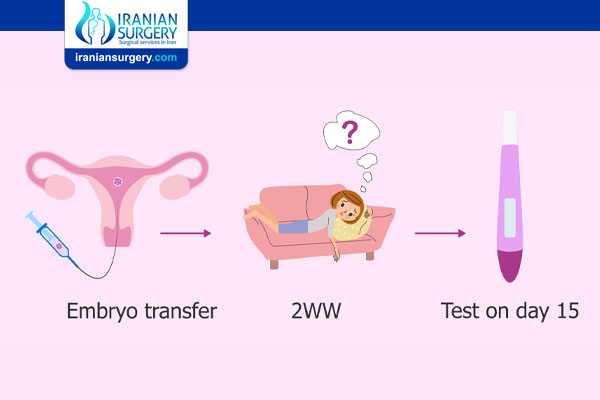Signs Of Failed IVF (in 2ww)
Signs Of Failed IVF (in 2ww)
Many people describe the journey of IVF treatment as a never-ending roller-coaster ride, filled with heart stopping peaks and troughs of emotion. And in what is all undoubtedly a challenging period, the time after your embryo transfer and before you can take a pregnancy test can be one of the worst.
Often referred to as the Two Week Wait or 2WW, it can be a period of isolation and doubt. After weeks of daily monitoring and conversations with your nurses and Fertility Specialist, this period can seem to be an interminable wait. A pregnancy test is not reliable until 16 days after your egg collection and because you've been focusing on your body for the past four weeks (or more), you'll notice and analyze every twinge, symptom or sensation. Iranian Surgery’s Counsellors, Nurse Coordinators and Fertility Specialists are all available to support you during this time and we have a range of tools and programs to help you cope.
In this post we’re going to outline some of the sensations or changes to your body that can occur during this time to help you understand what is normal.
Contact us for more information on what to do after a Failed IVF in Iran.
You can contact us for more information on what to do after Failed IVF in Iran.
Will My Symptoms During The 2ww Tell Me Whether I Am Pregnant or Not?
During the 2ww (2 weeks wait, from embryo transfer to the pregnancy test) it is very natural to wonder about the fate of the embryos which are transferred to the uterus. Every woman who has had an embryo transfer longs to know the outcome of her IVF cycle. Every minute of the 2ww lasts an hour - and the 2ww is the longest wait for any woman who has undergone IVF.
When going through the 2ww, women become aware of even the slightest change that happens to their bodies. “I am feeling warmer than usual”; “I have a tingling feeling in my breast”; “my nipples are sore”; “I could sense a muscle being pulled in my pelvic region”; “I have a strange vaginal discharge”; “I urinate frequently”; “I feel nauseous - does this mean I am pregnant?” This is the question that lingers in the mind of every woman - whether they explicitly acknowledge it or not. This can be made worse by a worried spouse who solicitously asks every day – “How are you feeling?” Many women constantly surf the web to read about the 2ww symptoms of women who got pregnant after an embryo transfer. Although this can make the 2ww interesting and can help some women to cope with it, many women start to panic too when they do not experience any symptoms. Others start imagining that they are pregnant or if they have any of the about symptoms.
Are there really any symptoms which could tell you whether you are pregnant or not, before taking a pregnancy test?
Sadly, the answer is no. While every woman is different, the reality is that your body cannot provide you with any clue during the 2ww which could tell you whether you are pregnant or not. Women who do not have any symptoms at all find they are pregnant - while women who experience all the symptoms can end up getting a negative pregnancy test. During the 2ww, your body is under the influence of the two most important sex hormones - estrogen and progesterone. These sex hormones have an influence on many of your body functions. Because of excess progesterone, your body becomes warmer than usual; your digestive system becomes sluggish and you can suffer from constipation; water accumulates in your tissues leading to sore breasts and nipples; you might have low-back pain, cramps and so on. High estrogen can make you nauseous; can cause breast pain, and might make you sensitive to smells. So, the symptoms you experience during 2ww are only due to the high levels of these hormones, which is why they are so similar to the symptoms of PMS (premenstrual syndrome). The only proof whether you are pregnant or not is a positive blood pregnancy test.
About Iranian Surgery
Iranian surgery is an online medical tourism platform where you can find the best doctors and fertility specialists in Iran. The price of IVF in Iran can vary according to each individual’s case and will be determined by an in-person assessment with the doctor.
For more information about the cost of IVF in Iran and to schedule an appointment in advance, you can contact Iranian Surgery consultants via WhatsApp number 0098 901 929 0946. This service is completely free.
Source:
https://www.genea.com.au/blog/april-2014/two-week-wait
https://www.drmalpani.com/knowledge-center/articles/the-2-ww-and-ivf


